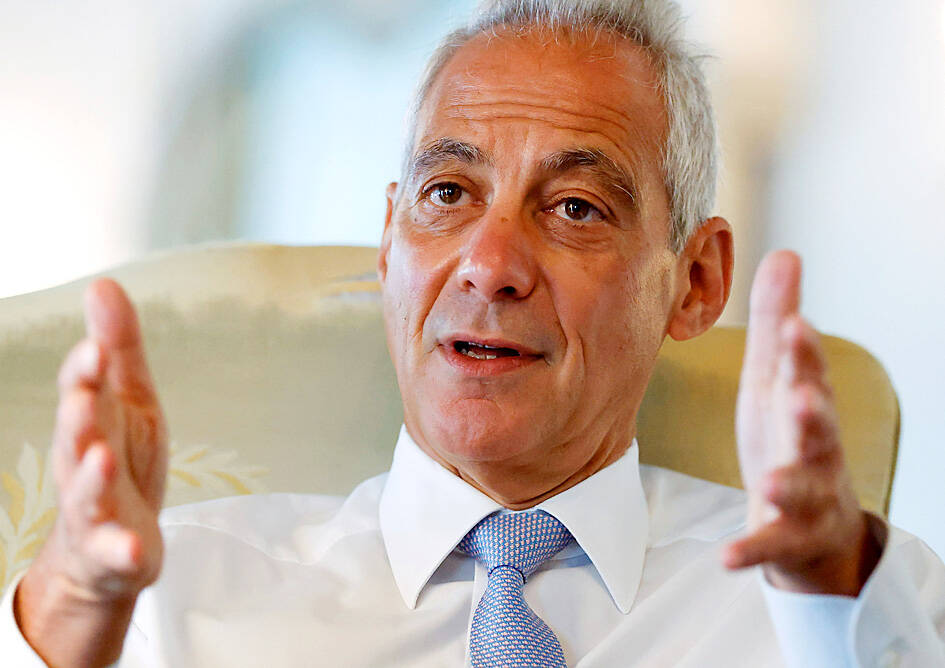The US is in discussions with Japan, the Netherlands and South Korea to restrict semiconductor exports to China, and it needs all parties to agree on a deal, US Ambassador to Japan Rahm Emanuel said in an interview.
Stressing the importance of South Korean and Dutch cooperation alongside Japan, he spoke by telephone ahead of Japanese Prime Minister Fumio Kishida’s summit with US President Joe Biden on Friday.
The two allies would endorse a joint statement covering a wide range of security issues, but work is continuing on a chip industry restriction deal, he said.

Photo: REUTERS
“You’ve got to work through not just Japan, but you’ve got to work through obviously Korea, you’ve got to work through the Dutch,” Emanuel said. “It’s going to take a lot of work.”
South Korea is home to two of the world’s leading memory chipmakers, Samsung Electronics Co and SK Hynix Inc, while the Netherlands has ASML Holding NV, maker of the world’s most advanced chip lithography systems.
Japan, whose businesses provide essential machinery and materials for chip fabricators, also plays a critical role in the industry’s supply chain. Washington hopes to align all three nations in pursuing its stricter measures on China exports.
“All the parties are at the table, all the parties have a mutual shared interest in the outcome. Everybody has different aspects of the industry,” Emanuel said.
The deal being sought “will not be just bilateral,” he said. “It must be multilateral.”
The South Korean government is not in discussions with the US about its participation in US restrictions on exports to China, a spokesman at the South Korean Ministry of Trade, Industry and Energy said.
The US rolled out sweeping measures in October last year to limit the sale of advanced semiconductors and chipmaking equipment to China, which the Biden administration said aim to limit the Chinese military’s access to and development of advanced tech.
Beijing has challenged the move at the WTO, and said the restrictions threaten the stability of the global supply chain.
Taiwan has formally requested to join the WTO negotiations, as it wants to understand how global semiconductors could be affected, the Office of Trade Negotiations said in a statement on Friday.
Japan and the Netherlands have agreed in principle to join the US in tightening controls, Bloomberg reported last month.
Adding South Korea would be a debilitating blow to Chinese industry, and Beijing has sought to improve ties with its neighbor amid concerns over Washington’s plans.

SEEKING CLARITY: Washington should not adopt measures that create uncertainties for ‘existing semiconductor investments,’ TSMC said referring to its US$165 billion in the US Taiwan Semiconductor Manufacturing Co (TSMC, 台積電) told the US that any future tariffs on Taiwanese semiconductors could reduce demand for chips and derail its pledge to increase its investment in Arizona. “New import restrictions could jeopardize current US leadership in the competitive technology industry and create uncertainties for many committed semiconductor capital projects in the US, including TSMC Arizona’s significant investment plan in Phoenix,” the chipmaker wrote in a letter to the US Department of Commerce. TSMC issued the warning in response to a solicitation for comments by the department on a possible tariff on semiconductor imports by US President Donald Trump’s

The government has launched a three-pronged strategy to attract local and international talent, aiming to position Taiwan as a new global hub following Nvidia Corp’s announcement that it has chosen Taipei as the site of its Taiwan headquarters. Nvidia cofounder and CEO Jensen Huang (黃仁勳) on Monday last week announced during his keynote speech at the Computex trade show in Taipei that the Nvidia Constellation, the company’s planned Taiwan headquarters, would be located in the Beitou-Shilin Technology Park (北投士林科技園區) in Taipei. Huang’s decision to establish a base in Taiwan is “primarily due to Taiwan’s talent pool and its strength in the semiconductor

An earnings report from semiconductor giant and artificial intelligence (AI) bellwether Nvidia Corp takes center stage for Wall Street this week, as stocks hit a speed bump of worries over US federal deficits driving up Treasury yields. US equities pulled back last week after a torrid rally, as investors turned their attention to tax and spending legislation poised to swell the US government’s US$36 trillion in debt. Long-dated US Treasury yields rose amid the fiscal worries, with the 30-year yield topping 5 percent and hitting its highest level since late 2023. Stocks were dealt another blow on Friday when US President Donald

UNCERTAINTY: Investors remain worried that trade negotiations with Washington could go poorly, given Trump’s inconsistency on tariffs in his second term, experts said The consumer confidence index this month fell for a ninth consecutive month to its lowest level in 13 months, as global trade uncertainties and tariff risks cloud Taiwan’s economic outlook, a survey released yesterday by National Central University found. The biggest decline came from the timing for stock investments, which plunged 11.82 points to 26.82, underscoring bleak investor confidence, it said. “Although the TAIEX reclaimed the 21,000-point mark after the US and China agreed to bury the hatchet for 90 days, investors remain worried that the situation would turn sour later,” said Dachrahn Wu (吳大任), director of the university’s Research Center for